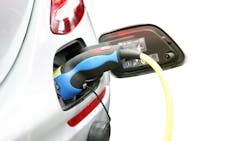Tucson Electric Power EV Plan Gets Green Light
Tucson Electric Power has received the green light from state regulators to move ahead with our three-year Transportation Electrification Implementation Plan, which provides a roadmap for preparing the grid for extra energy loads, driving EV adoption and building an equitable charging infrastructure.
The plan builds on its existing programs and incentives while adding some innovative programs that increase accessibility to electric transportation and promote awareness of EV technology and its benefits. It also aligns with TEP's transition to greener resources to reduce carbon emissions for a healthier community.
Among the new initiatives are a grid impact analysis study, rebates on electric bikes, informational kiosks at car dealerships and support for school bus electrification.
Here are some of the highlights of our EV plan, which will roll out through 2025:
Grid Impact Planning study
The growing popularity of EVs will drive higher electricity demand for charging. In the long term, that may require upgrades to our distribution and transmission systems.
This year, TEP plans to conduct an 8-month study to identify areas of higher EV adoption, potential loads on our circuits and ways to manage those loads to minimize the impact on the grid.
“We know that loads on our system will increase with EV adoption growth. The study will provide a multi-scenario long-term forecast of load growth along with visibility into areas that might need upgrades. Findings also will help us align our infrastructure projects to ensure we meet the needs of our customers by taking steps now to minimize the impact,” noted Camila Martins-Bekat, senior market development representative.
Electric Bike Rebates
Beginning later this year, TEP will offer rebates of up to $600 for the purchase of new electric bikes used as a cleaner mode of transportation. Electric bikes are less expensive to own and operate than cars or trucks, making them particularly attractive for residents with low or limited incomes. “This program is intended to encourage customers to substitute gas vehicle trips with an electric bike where appropriate” said Martins-Bekat. “We hope to launch the program mid-year and have up to 360 participants for the three-year program.”
Schools Bus Program
TEP will offer incentives to help school districts transition their bus fleets from gas to electricity to reduce urban emissions and operating costs. To help schools plan and overcome the financial barriers to an emissions-free fleet, TEP will offer fleet phasing planning assistance and an incentive of up to $250,000 per bus to schools serving primarily low-income students. Funding is available to support up to 30 buses over a 3-year period. The program also provides school districts with financial incentives for installing chargers as well as seat belts in the electric buses.
Educational Awareness for Dealerships and Customers
To increase education and awareness of EVs and their benefits, TEP will install interactive kiosks in three local car dealerships. The stations will provide customers and dealership staff with information about EV model availability, location of public EV charging, route planning assistance and TEP’s incentive programs, including home charger rebates and EV rate plans.
“Surveys show that most people still don’t know much about EV technology and charging,” said Martins-Bekat, “and they often aren’t aware of the benefits, such as lower operating costs and the ability of most EVs to meet their daily driving needs.”
Nonprofit Ride Share Program (Pilot)
To ensure that all customers benefit from transportation electrification, TEP will begin offering incentives in 2024 to nonprofit groups that provide transportation to seniors and participants in workforce development programs. The incentives will provide up to $30,000 each for up to six vehicles purchased for ride share purposes in addition to incentives for up to six charging ports that cover up to 95 percent of their cost.
Multi-use Charging Hub
Recognizing that not all EV owners will have the option to charge at home, TEP plans to work with companies such as Uber and Lyft and local governments beginning in 2025 to develop public charging hubs for multiple users. Incentives would be offered for the installation of 10 Level 2 or DC Fast Charging ports at various locations.
“The initiatives in our plan will prepare our community for the EV revolution. We’re committed to helping our customers meet their transportation electrification goals, with an emphasis on ensuring that all members of our community enjoy the benefits,” Martins-Bekat said.
To view the entire plan, visit the ACC docket.
